Early in the morning of 18 April 1955, the man Time magazine in 1999 named the “Person of the Century” – the great physicist, Albert Einstein – died in a hospital room in Princeton, New Jersey. The 76-year-old genius spent a remarkable lifetime unraveling the secrets of the universe, revolutionizing the world of physics with his groundbreaking theory of relativity.
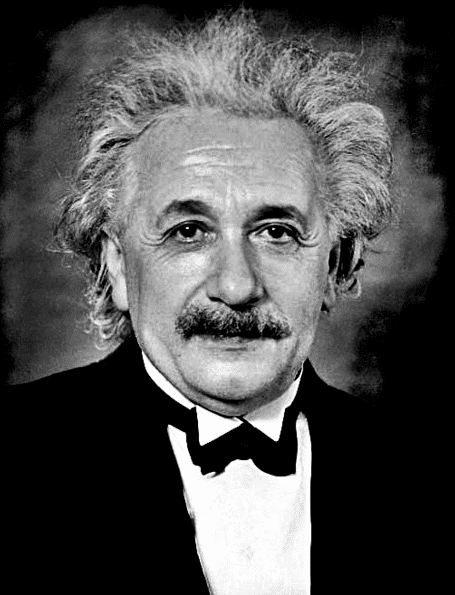
There was one mystery, however, that Einstein took to his grave with him: in his closing moments he said his final statements in German, which the attending nurse (the only person in the room at the time) did not speak – and so the world will never know what this great man’s dying words were.
Einstein was born to Jewish parents in Germany on 14 March 1879. Up until the age of three the child never uttered a single word, and his parents feared something was wrong with him. Then the boy began to communicate, and quickly established his genius. He mastered a complicated geometry textbook by the age of 10, at 11 was discoursing on the philosophy of Immanuel Kant, and by 14 had taught himself algebra, analytical geometry, and integral and differential calculus – subjects not taught in his school. In 1905 Einstein, at the age of 26, published four brilliant scientific articles that caught the world’s attention, one of which introduced his theory of relativity. In 1921 he was awarded the Nobel Prize in Physics.
Einstein became a professor at the Berlin Academy of Sciences, and was visiting the United States in 1933 when Hitler came to power. Einstein never returned to Germany, deciding instead to settle in the U.S.; he became an Americana citizen in 1940. He began teaching and studying at Princeton’s Institute for Advanced Study, where he remained active the rest of his life.
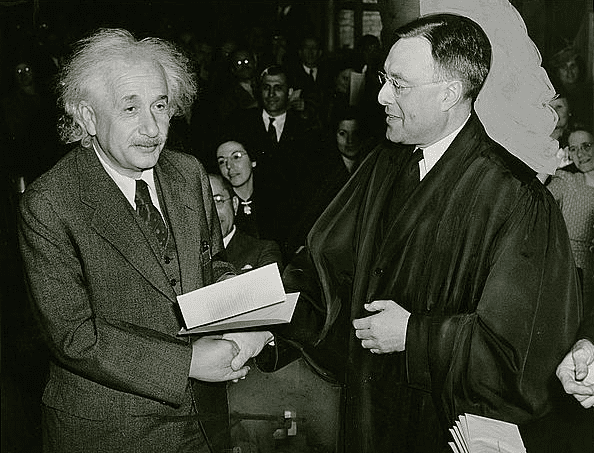
The following newspaper articles from a New Jersey newspaper report on Einstein’s death, and record the reactions of several prominent officials, as well as “man on the street” interviews with Princeton residents. Together they present a portrait of this humble, brilliant, and astonishingly gifted man, described as the “father of the atomic age.”
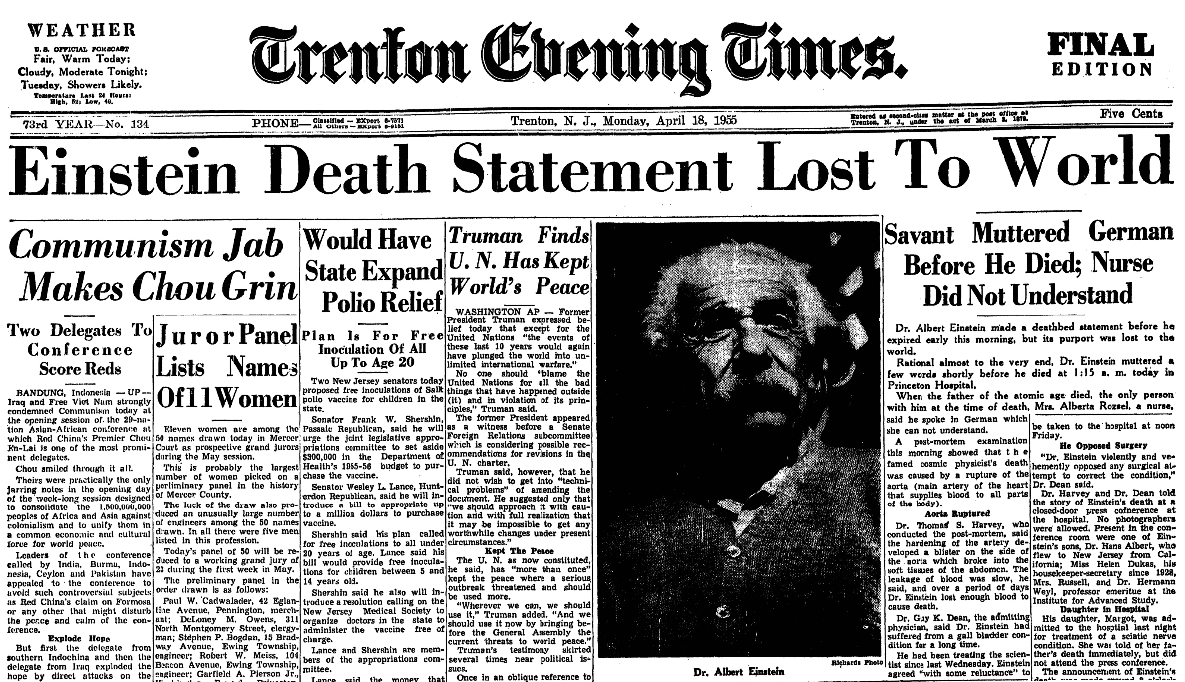
Here is a transcription of this article:
Einstein Death Statement Lost to World
Savant Muttered German before He Died;
Nurse Did Not Understand
Dr. Albert Einstein made a deathbed statement before he expired early this morning, but its purport was lost to the world.
Rational almost to the very end, Dr. Einstein muttered a few words shortly before he died at 1:15 a.m. today in Princeton Hospital.
When the father of the atomic age died, the only person with him at the time of death, Mrs. Alberta Rozsel, a nurse, said he spoke in German which she cannot understand.
A post-mortem examination this morning showed that the famed cosmic physicist’s death was caused by a rupture of the aorta (main artery of the heart that supplies blood to all parts of the body).
Aorta Ruptured
Dr. Thomas S. Harvey, who conducted the post-mortem, said the hardening of the artery developed a blister on the side of the aorta which broke into the soft tissues of the abdomen. The leakage of blood was slow, he said, and over a period of days Dr. Einstein lost enough blood to cause death.
Dr. Guy K. Dean, the admitting physician, said Dr. Einstein had suffered from a gall bladder condition for a long time.
He had been treating the scientist since last Wednesday. Einstein agreed “with some reluctance” to be taken to the hospital at noon Friday.
He Opposed Surgery
“Dr. Einstein violently and vehemently opposed any surgical attempt to correct the condition,” Dr. Dean said.
Dr. Harvey and Dr. Dean told the story of Einstein’s death at a closed-door press conference at the hospital. No photographers were allowed. Present in the conference room were one of Einstein’s sons, Dr. Hans Albert, who flew to New Jersey from California; Miss Helen Dukas, his housekeeper-secretary since 1928, Mrs. Russell, and Dr. Hermann Weyl, professor emeritus at the Institute for Advanced Study.
Daughter in Hospital
His daughter, Margot, was admitted to the hospital last night for treatment of a sciatic nerve condition. She was told of her father’s death immediately, but did not attend the press conference.
The announcement of Einstein’s death was made around 8 o’clock this morning – seven hours after it occurred.
The scientist’s family is believed to have requested that his illness be kept secret and that the announcement of death be delayed.
Funeral Private
The family said the funeral would be strictly private and that no announcement about his burial – or his will – would be made.
Dr. Einstein had been given another in a series of sedatives and was sleeping quietly at 11 o’clock last night, Dr. Dean said. Dr. Dean said he decided not to awaken him.
Mrs. Rozsel, the private duty nurse in the hospital room, said that Einstein spoke in German several times as he slept.
Describes Death
“Suddenly, at 1:10 o’clock, I noticed that he was breathing differently,” she told authorities. “I called another nurse and we elevated the head of his bed. There were two deep breaths and he expired.”
Report Burial Today
It was reported in Princeton that the 76-year-old genius was to be buried this afternoon. This could not be confirmed, however, since no member of the family or spokesman for the Institute for Advanced Study would make any comment.
Miss Dukas, Einstein’s secretary-housekeeper, looked pale and shaken at the press conference. She declined to talk to the press.
Einstein’s older son, Hans, 50, arrived in Princeton Saturday after flying in from California. Another son, Edward, 45, is living in Switzerland. The only other immediate survivors are two grandchildren, the children of the scientist’s son Hans.
Oppenheimer Mourns Loss
Dr. J. Robert Oppenheimer, father of the atom bomb, said today that Albert Einstein was “one of the great men of all ages.”
Oppenheimer, director of the Institute for Advanced Study at Princeton, said the death of his colleague and close personal friend was “a kind of mourning for all scientists and for most men.”
The statement was given out by the Institute here since Oppenheimer was en route to the West Coast for a lecture tour.
Einstein was one of the first among the Institute’s great personalities to come to Oppenheimer’s support last year when he was dropped by the Atomic Energy Commission as a security risk.
A statement from the Institute’s faculty said the death of Einstein had stricken them with “profound grief.”
“With all the world they share the feeling that one of the great figures of mankind’s struggle for intellectual insight and moral improvement has passed from among us into the indelible record where his lofty place has been assured; but they mourn in addition the loss of a great friend, a wise and gentle counselor, and a deeply loved companion, whose going leaves an aching void in the community of the Institute with which he has been identified from its very beginning.”
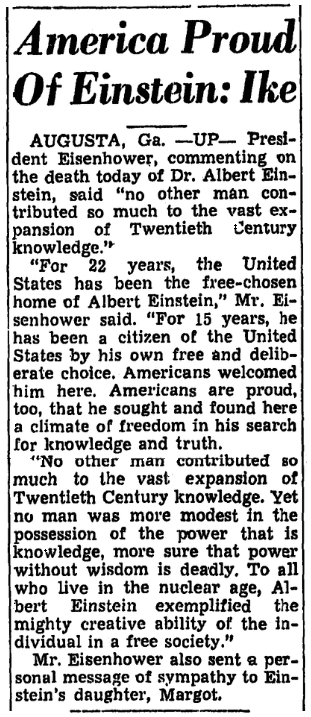
Here is a transcription of this article:
America Proud of Einstein: Ike
AUGUSTA, Ga. – (UP) – President Eisenhower, commenting on the death today of Dr. Albert Einstein, said “no other man contributed so much to the vast expansion of Twentieth Century knowledge.”
“For 22 years, the United States has been the free-chosen home of Albert Einstein,” Mr. Eisenhower said. “For 15 years, he has been a citizen of the United States by his own free and deliberate choice. Americans welcomed him here. Americans are proud, too, that he sought and found here a climate of freedom in his search for knowledge and truth.
“No other man contributed so much to the vast expansion of Twentieth Century knowledge. Yet no man was more modest in the possession of the power that is knowledge, more sure that power without wisdom is deadly. To all that live in the nuclear age, Albert Einstein exemplified the mighty creative ability of the individual in a free society.”
Mr. Eisenhower also sent a personal message of sympathy to Einstein’s daughter, Margot.
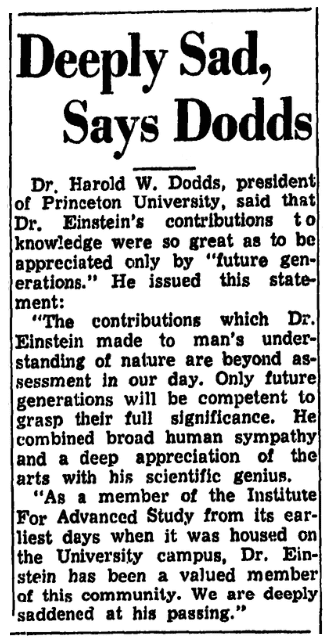
Here is a transcription of this article:
Deeply Sad, Says Dodds
Dr. Harold W. Dodds, president of Princeton University, said that Dr. Einstein’s contributions to knowledge were so great as to be appreciated only by “future generations.” He issued this statement:
“The contributions which Dr. Einstein made to man’s understanding of nature are beyond assessment in our day. Only future generations will be competent to grasp their full significance. He combined broad human sympathy and a deep appreciation of the arts with his scientific genius.
“As a member of the Institute for Advanced Study from its earliest days when it was housed on the University campus, Dr. Einstein has been a valued member of this community. We are deeply saddened at his passing.”
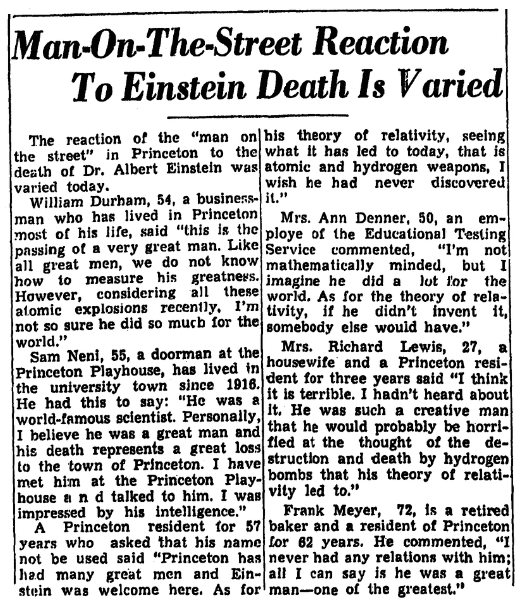
Here is a transcription of this article:
Man-on-the-Street Reaction to Einstein Death Is Varied
The reaction of the “man on the street” in Princeton to the death of Dr. Albert Einstein was varied today.
William Durham, 54, a businessman who has lived in Princeton most of his life, said: “This is the passing of a very great man. Like all great men, we do not know how to measure his greatness. However, considering all these atomic explosions recently, I’m not so sure he did so much for the world.”
Sam Neni, 55, a doorman at the Princeton Playhouse, has lived in the university town since 1916. He had this to say: “He was a world-famous scientist. Personally, I believe he was a great man and his death represents a great loss to the town of Princeton. I have met him at the Princeton Playhouse and talked to him. I was impressed by his intelligence.”
A Princeton resident for 57 years who asked that his name not be used said: “Princeton has had many great men and Einstein was welcome here. As for his theory of relativity, seeing what it has let to today, that is atomic and hydrogen weapons, I wish he had never discovered it.”
Mrs. Ann Denner, 50, an employee of the Educational Testing Service, commented: “I’m not mathematically minded, but I imagine he did a lot for the world. As for the theory of relativity, if he didn’t invent it, somebody else would have.”
Mrs. Richard Lewis, 27, a housewife and a Princeton resident for three years, said: “I think it is terrible. I hadn’t heard about it. He was such a creative man that he would probably be horrified at the thought of the destruction and death by hydrogen bombs that his theory of relativity led to.”
Frank Meyer, 72, is a retired baker and a resident of Princeton for 62 years. He commented: “I never had any relations with him; all I can say is he was a great man – one of the greatest.”
Note: An online collection of newspapers, such as GenealogyBank’s Historical Newspaper Archives, is not only a great way to learn about the lives of your ancestors – the old newspaper articles also help you understand American history and the times your ancestors lived in, and the news they talked about and read in their local papers – including more recent events.
